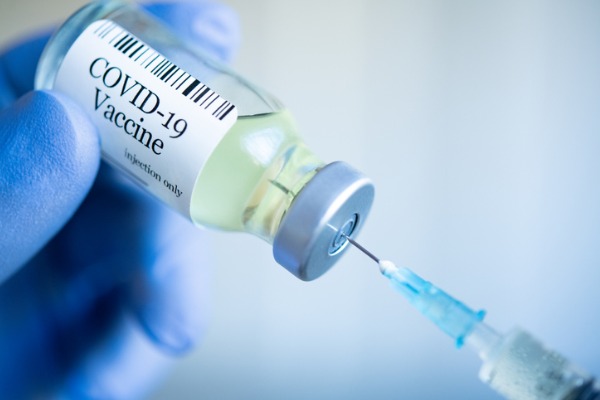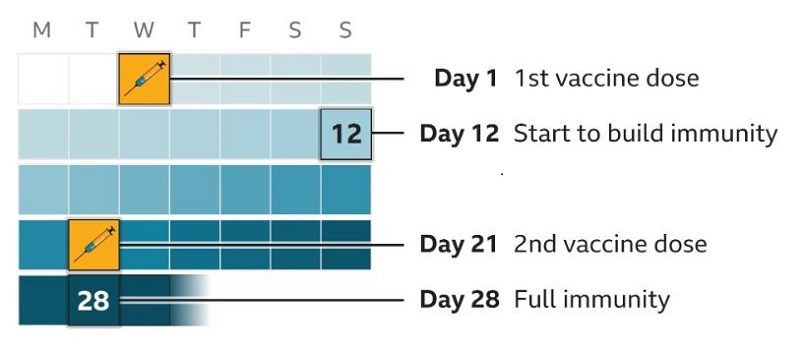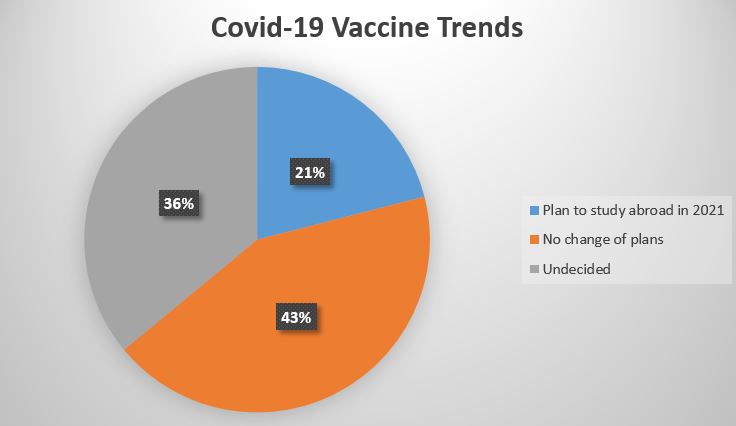Renewed hope spurs among Indian Students wanting to Study Abroad with the availability of COVID-19 Vaccine

Coronavirus COVID-19: The world is in the middle of a global COVID-19 pandemic as the World Health Organization (WHO) and administrations of every country work towards tracking the disease, advising on medical intervention, and above all trying to keep the general public safe. The solution? A COVID-19 Vaccine.
A COVID-19 Vaccine is the only viable solution to the pandemic that would be a year old on December 31, 2020. Vaccines are designed to train and prepare the body’s immune system to fight off viruses and bacteria, preventing any illness. Currently, more than 50 COVID-19 vaccine candidates are under trial.
There is light at the end of the tunnel, as various vaccine manufacturers have applied and got permission for emergency use across nations. The frontrunners include – Pfizer-BioNTech COVID-19 Vaccine developed by US manufacturer Pfizer and German biotechnology company BioNTech; Moderna COVID Vaccine manufactured by Moderna of Cambridge, Massachusetts with an efficacy rate of 95% and 94% respectively.
Predict your IELTS, TOEFL, and PTE in just 4 steps!
Countries such as Bahrain, Canada, China, Malaysia, Mexico, Russia, Switzerland, the UK, the USA, and counting have already authorized the use of COVID-19 Vaccine for their citizens. However, they come with their own drawbacks which include storage under ultra-low temperatures and two doses having to be administrated 28 days apart – which prove to be a massive logistical hurdle.
Covid-19 Vaccine - timeline | source: BBC
In India, Covishield developed by the University of Oxford and Aglo-Swedish drug maker AstraZeneca and to be mass-produced by Serum Institute of India (SII) and indigenously developed Covaxin by Bharat Biotech, a pharmaceutical company based in Hyderabad are the major front runners, who have applied for emergency use of the drug. Other vaccine manufacturers include, ZyCov-d being developed by Ahmedabad-based pharmaceutical company Zydus Cadila; Covovax being manufactured by SII in partnership with US-based biotech company Novavax and Sputnik V being developed by Russia’s Gamaleya Research Institute of Epidemiology and Microbiology in partnership with Hyderabad-based pharmaceutical major Dr Reddy’s.
As per the Union Health Minister, Dr. Harsh Vardhan, Indians can expect to be vaccinated any week in January 2021. For the first phase of immunization, the Government of India has identified 30 crore people who would be vaccinated in the first round.
Get best suited colleges for you in real-time
Tell us about your country, course, budget & more
Discover best colleges that meet all your needs
Also Read
- How is Coronavirus affecting Study Abroad Students?
- Affected by Coronavirus: What all international students and aspirants should know
- Future of Study Abroad: Countries consider re-opening to International Students amid COVID-19 Crisis
The coronavirus COVID-19 has definitely had adverse effects on all sectors slowing down business by manifolds. Similarly, the study abroad industry which runs into billions every year has been severely hit. In view of preventing the spread of the virus, countries have closed international borders bringing a halt to students wanting to study abroad. Studying abroad also gives students an opportunity to learn in a new environment and gain a handful of experience of working overseas. While education has shifted to remote learning, the magic of learning in-class has eluded online education.
The majority of students who are required to apply for education loans to afford to study abroad have been more than hesitant to enroll into universities abroad only to have to study a semester or two online in their own country or till the pandemic subsides. A study conducted by QS Quacquarelli Symonds Ltd. in February 2020 shows how study abroad plans of 61% of students were not affected by the current global health crisis, while 27% of students felt otherwise.
Of the 27% of students whose study abroad plans have been affected due to the ongoing pandemic crisis, 37% want to defer their admission to next year, 33% intend to study in a different country and 11% want to no longer pursue their education overseas. In the hindsight, these numbers show that the impact of coronavirus on international student enrollment is going to be short-lived. READ: How is Coronavirus affecting Study Abroad Students?
_Infograph_(Rahul)11.jpg)
Another recent research conducted by QS that surveyed 887 prospective international students from China, India, Pakistan, the UK, and the US showed that 21% of respondents considered bringing their study abroad plans forward with the introduction of a potential COVID-19 vaccine, while 43% expressed no desire to change their plans just yet. While the undecided are hopeful that things will go back to normal with the actual availability of the vaccine in 2021 thus displaying a promising trend as far as studying abroad 2021 is concerned with the availability of the Covid-19 Vaccine on the horizon.
With the development and the actual availability of the COVID-19 Vaccine, there is renewed hope among prospective Indian students wanting to study abroad. The research concluded by QS, clearly indicates that students are keen to start studying abroad with growing talks of the availability of a vaccine. With governments making elaborate plans to roll out vaccines as early as possible (read January), there is confidence among students to resume overseas education in 2021.
Related Reads
- Impact of Covid-19 lockdowns globally on study abroad plans of Indian students
- Coronavirus Update: International Students left in confusion as universities shut campuses
- Coronavirus impact on international students looking to study in Canada
The COVID-19 has thrown all universities into uncharted territory with most international students having to cancel or defer their study abroad plans because of the various travel restriction imposed by international countries. There is no doubt that this billion-dollar industry is a major contributor to the economy and with reduced international registrations, universities have been hit in a rare manner.
A pre-Covid survey conducted by QS concluded that 45% of international students would only go ahead with their overseas education when campuses reopened and face to face education was resumed. While another 43% were hopeful to study abroad once the vaccine was available. So we can infer that remote education did have adverse effects on enrolments for international students. However, universities with approved COVID-19 preparedness who plan to reopen campuses and resume face-to-face teaching are at a major advantage.
With increased deferral among international students for the academic year 2020 and with the availability of a COVID-19 Vaccine, universities could look at an increased number of international applications during the upcoming application cycle, given that vaccination allows for a return to safe student mobility.
This is definitely a promising development, and the academic year 2021-22 could be strongly represented by international students among universities around the world – thus ensuring new life to the international higher education sector in 2021.
Confused about Studying Abroad during the pandemic? You can get in touch with our team of experts at Shiksha Counselling Services or in the comments below for further guidance.
Also Read



